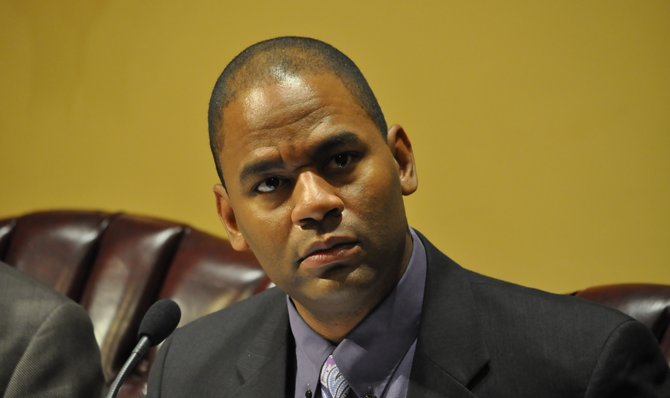A potential ban on firearms on municipal property is stalled in the Jackson City Council’s Rules Committee. Photo by Trip Burns.
Jackson City Council President Charles Tillman's effort to ban firearms in certain public areas is encountering new obstacles that could ultimately sink the measure.
One of them is Ward 4 Councilman De'Keither Stamps.
Stamps argued during a Jan. 7 rules committee meeting that the proposed ordinance—which would ban the carrying of firearms, except by sworn law officers, at public places—goes too far for a number of reasons.
The law is too vague, Stamps said, adding that language about toy guns could lead to problems between law enforcement officials and the public.
"I think we're going a little far when you can't have a water gun in the park," Stamps said. "I understand (that the ordinance is designed to protect people), but it should be incumbent upon our training and how we train our officers. (When you include language about toy guns) you lead the ability for people to be detained because they have a water gun."
Ward 3 Councilwoman LaRita Cooper-Stokes pointed out that toy guns that look like real guns could be used in crimes, and that both citizens and police officers have the ability to use common-sense judgment when dealing with those situations.
"I think reasonable people would just not bring it if they know they shouldn't. We can make it part of a campaign, or just have signage at our parks so people would know what we can and can't bring."
Stamps also questioned the city's authority to ban the carrying of concealed weapons in certain areas, asking if the council even had the authority to exercise a ban outlined in the language of the ordinance.
The Jackson Police Department says it does.
In accordance with a Dec. 3, 2012, opinion from the office of Mississippi Attorney General Jim Hood, JPD attorney Latrice Westbrooks made adjustments to the ordinance, removing language saying that "any" municipal property would be covered. Assistant Attorney General Ricky Luke wrote in the opinion in December that gun owners who hold "enhanced permits" can carry their weapons to places like voting precincts, churches and inside passenger terminals of airports, even if signs that prohibit them are posted.
How far the council can go in limiting the carrying of firearms is unclear, and a lot depends on whether the city is trying to ban concealed, or "enhanced" permit-holders, or open carrying.
Under current Mississippi law, adults do not need permits to carry a gun that is not concealed, but any person with a standard permit may not carry a concealed weapon in certain places, including schools, colleges or professional athletic events "not related to firearms."
Westbrooks said the city does have some room to exert its will, and that the legal team had brought the ordinance into compliance with the attorney general's opinion.
"Municipalities have limited authority to regulate concealed weapons and openly carried weapons," Westbrooks said. "That's one of the things the Dec. 3 attorney general's opinion outlined. So, our capacity is somewhat limited to municipal property. ... We're trying to stay within the confines of the statute."
Still, Stamps iterated his philosophical disagreement with the measure, which he said will turn citizens into targets. Creating gun-free zones, he said, invited criminals to prey upon defenseless citizens.
"When you know all the people in this certain area have been disarmed, it creates an opportunity for crime
"Creating gun-free zones create an opportunity for crime. When you know all the people in this certain area have been disarmed, it creates an opportunity for crime," Stamps said. "Criminals don't follow the law, the law-abiding citizens follow the law. So we follow the law, and now we're being harmed because they don't."
Cooper-Stokes, who chairs the rules committee, did not call for a vote on the ordinance, so it will not placed on the Council's regular agenda.



Comments